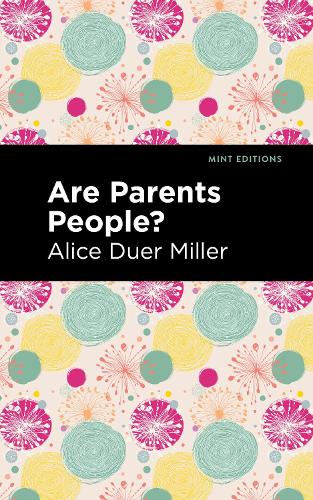
Are Parents People
(Hardback)
Publishing Details
Are Parents People
By (Author) Alice Duer Miller
Contributions by Mint Editions
West Margin Press
West Margin Press
24th May 2022
United States
Classifications
General
Fiction
813.52
Physical Properties
Hardback
202
Width 127mm, Height 203mm
Description
Are Parents People (1924) is a collection of stories by Alice Duer Miller. Inspired by her work as an activist for womens suffrage, Miller explores themes of independence, agency, and female desire while illuminating the subject of divorce. Her work was adapted into a 1925 comedy film starring Betty Bronson, Florence Vidor, and Adolphe Menjou. There they wereher mother looking down at her so calmly from the gallery and her father waiting so confidently for her below, each unaware of the other's presence. What in thunder was she going to do As the chairman of her schools self-government committee, Lita Hazlitt is a young woman committed to order. Seeing her parents in the same room for the first time since their acrimonious divorce, she longs for them to reunite so that their family can return to its former state. When her attempts at reconciliation fall on deaf ears, Lita begins to act out, threatening her parents with scandal by spending time with an older, married man. In each of its nine stories, Are Parents People explores the politics of divorce in middle to upper class American families. Witty and heartbreaking, Millers work is an utterly human look at the shortcomings of marriage in modern life. With a beautifully designed cover and professionally typeset manuscript, this edition of Alice Duer Millers Are Parents People is a classic of American literature reimagined for modern readers.
Author Bio
Alice Duer Miller (1874-1942) was an American novelist, poet, screenwriter, and womens rights activist. Born into wealth in New York City, she was raised in a family of politicians, businessmen, and academics. At Barnard College, she studied Astronomy and Mathematics while writing novels, essays, and poems. She married Henry Wise Miller in 1899, moving with him in their young son to Costa Rica where they struggled and failed to open a rubber plantation. Back in New York, Miller earned a reputation as a gifted poet whose satirical poems advocating for womens suffrage were collected in Are Women People (1915). Over the next two decades, Miller published several collections of stories and poems, some of which would serve as source material for motion picture adaptations. The White Cliffs (1940), her final published work, is a verse novel that uses the story of a young women widowed during the Great War to pose important questions about the morality of conflict and patriotism in the leadup to the United States entrance into World War II.
